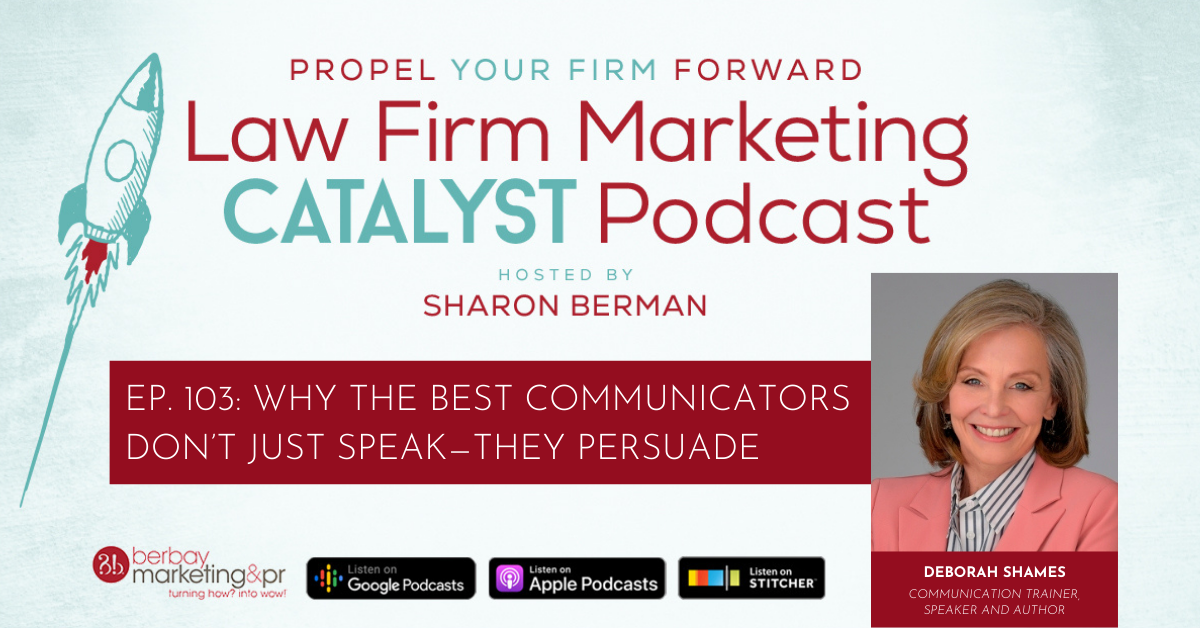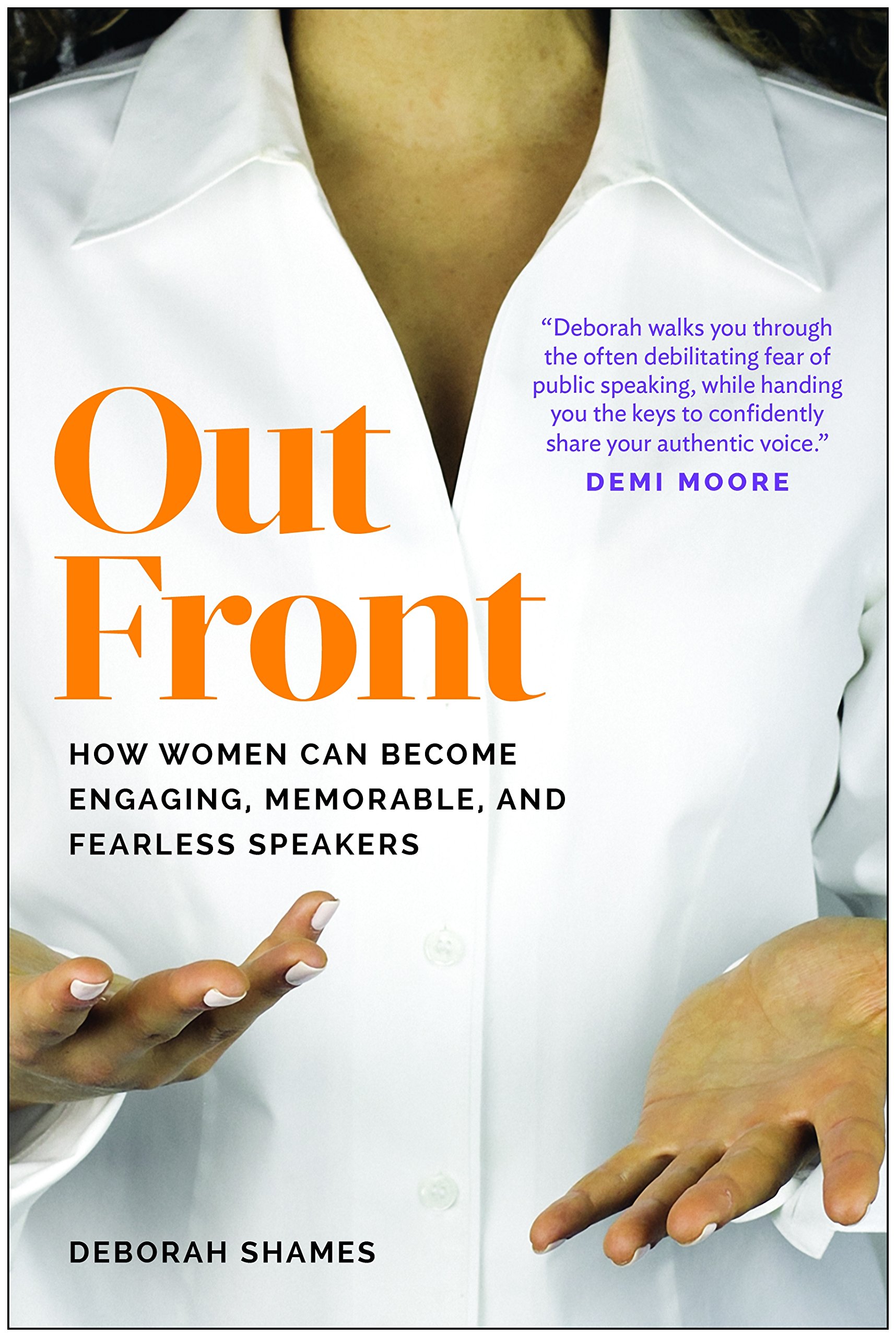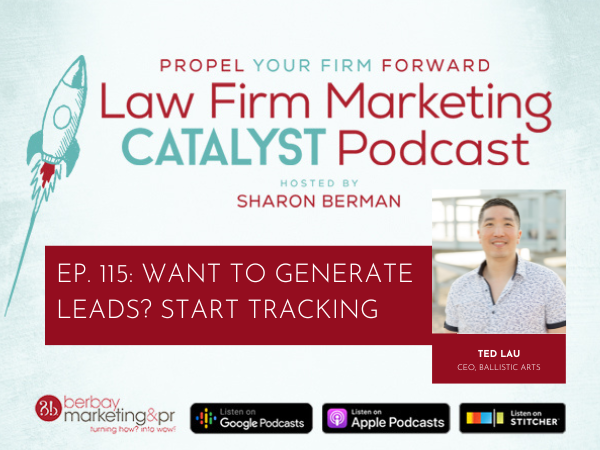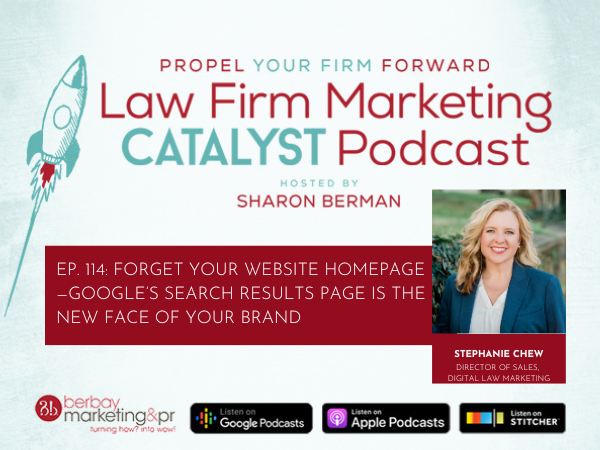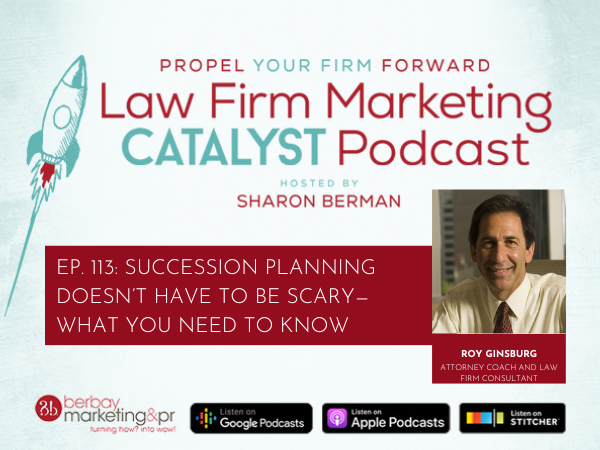Episode 103
What you’ll learn in this episode:
- Why lawyers should aim to persuade, not educate, when they’re communicating
- Deborah’s top three tips to become a better presenter
- Why professional women often hesitate to speak up, and how they can overcome this block
- Why understanding your intention is the first thing you should do before communicating
- How to create a newsletter that both you and your readers will stick with
About Deborah Shames
Deborah is passionate about speaking and training. That’s why she wrote or co-wrote four books on communication and public speaking, including the business best-seller “Own the Room.”
And because Deborah ran a successful film company in Sausalito, CA. for fourteen years, she knows how difficult it is for women to stand out and succeed. Her latest book is “Out Front: How Women Can Become Engaging, Memorable and Fearless Speakers.” She walks the talk by speaking regularly across the country to motivate and inspire professional women.
Deborah has coached and trained thousands of professionals from all industries to communicate more effectively. Her work has supported A-list performers in television and film, CEO’s of major corporations, gold-medal Olympians, and political candidates. Her clients also include professionals in finance, law and insurance.
Deborah ran the successful Calabasas group of a national business organization and was awarded “Consultant of the Year” by the Los Angeles Business Journal.
Deborah uses her experience directing over sixty award-winning films to make her business clients more genuine, effective, and successful. It doesn’t matter whether they are delivering a keynote address, speaking to a Board of Directors, or pitching for new business. Deborah donates her time training MBA candidates in presentation skills at UCLA, Pepperdine, USC and Cal Lutheran. Her personal goal is to prepare women, from Millennials to seasoned veterans, with the skills they need to be out front.
Additional Resources
Out Front: How Women Can Become Engaging, Memorable and Fearless Speakers
Transcript:
Although communication is a daily part of the job, lawyers aren’t immune to the fear of public speaking. With practice and intention, however, it’s possible to evolve from an anxious speaker to a confident, fearless one. Deborah Shames is proof: she has helped thousands of professionals become strong communicators through her speaking and training company, Eloqui, and she has overcome a fear of public speaking herself. She joined the Law Firm Marketing Catalyst Podcast to talk about her top tips to become a skilled speaker; how to identify your intention when communicating; and why persuasion is more effective than education. Read the episode transcript here.
Sharon: Welcome to The Law Firm Marketing Catalyst Podcast. Today, my guest is Deborah Shames, one of the founders of the speaking and training company Eloqui. She is author or coauthor of four books on presentation training. Her latest book is “Out Front: How Women Can Become Engaging, Memorable and Fearless Speakers.” The company’s training has made a difference in the careers of thousands of professionals across the country. Today, Deborah will tell us about her career path and how we can become better presenters. Deborah, welcome to the program.
Deborah: Thank you.
Sharon: So glad to have you. I love the word fearless in your title. How did you get where you are? Tell us about your career path.
Deborah: I was a film and television producer and director for many years. I found that the qualities and traits I used with actors could be used with business professionals. When I met David, my partner, who was in front of the camera as a presenter, we combined forces and translated performance techniques for the business professional.
Sharon: Did you find that actors were listening to you when you were talking?
Deborah: I produced and directed over 60 films and videos. Actors have all of these issues—not the best ones. Not the good ones like Danny Glover, Angela Lansbury and Rita Moreno, who I loved directing. But so many other actors were insecure and constantly needed reinforcement and feedback, and what I found when we switched to business professionals is they have the same issues. They had anxiety; they needed to know how to engage an audience. For me, it was so much easier because they didn’t have to memorize lines. So we translated the techniques from the entertainment world for business professionals, and I was thrilled never having to work with actors again.
Sharon: Did you decide after film and television producing you were going to teach people how to do this? How did you get to this stage?
Deborah: My partner, David, had an executive at a tech company. She needed to do media, and her handler said, “We need a woman to work with her.” David said, “I can be a lot of things, but I can’t be a woman,” so he asked me if I wanted to do it. When I went in and trained this woman on how to get her message across, how to engage, how to put herself in her answers rather than doing canned, generic ones, I asked David, “You get paid for this?” From then on we started to develop our business, first with workshops, then training, then one-on-ones.
Sharon: How did you name your business Eloqui?
Deborah: Eloqui is the Latin to speak out. It’s also a form of the word eloquence, and we wished we could bring back eloquence to the way people communicate today.
Sharon: It’s a form of the word eloquence?
Deborah: Yes, and the Latin version, eloqui.
Sharon: That’s a great name. Tell us about your business. I know you’re always very busy with your training. You do one-on-ones and groups?
Deborah: Eloqui primarily does training for teams, no more than 12 people, ideally six to eight. We also give keynotes. We give public workshops that everyone from your company has gone to that are half-days, and we do one-on-one. During the pandemic, all the one-on-ones were done virtually, but we’re thrilled that starting last fall, companies were saying, “Come back in and do in-person trainings. We’re sick and tired of Zoom and Teams meetings,” and we said, “So are we.”
Sharon: Did you find it was harder to teach people via Zoom, to teach them how to speak?
Deborah: We found that one-on-one works great virtually. It’s almost impossible to do group trainings virtually because of the distraction factor. People are looking and listening to everything else. It’s very hard to get them to be interactive. We’ve done some, and it was the most exhausting experience I’ve had. Keynotes and webinars are O.K., but again, people don’t pay attention the way they do if you do them in person.
Sharon: I’m sure that’s true. I think I would have a very hard time listening when the dog comes in or whatever.
Deborah: When people are on a virtual session, they check web browsers; they check email; they tell you they’re listening, but their eyes are darting back and forth and you know they’re not. I don’t blame them. Now, one-on-one, like we’re doing right now, that’s fine, but the others are tough. When people tell me they’re exhausted after a virtual session, I say, “Of course you are. You’re on camera and right up close, and that can be exhausting.”
Sharon: Do you still do Zooms?
Deborah: I do, but I really limit them to one-on-one sessions like I have later this afternoon.
Sharon: And you teach all over the country, right?
Deborah: Yes. We just got back from New Jersey with a new client where we taught IT managers. In two days, we fly back to Costa Mesa near L.A. to do a group of immigration attorneys. In late July we return to Glidewell Dental to train female dentists who come in from all over the country. I love the variety of clients we have. It makes it fun for me.
Sharon: It sounds like a variety. When you talk to certain groups—let’s say attorneys—do you find them more resistant than CPAs or dentists? That’s a leading question.
Deborah: I don’t find lawyers more resistant, but there’s a huge difference between practicing law, no matter what your practice area is, and being a networker or bringing in business. That’s what lawyers have the biggest difficulty with. They will tell us, “We didn’t go to law school to do sales, but you have to do sales if you want to be made partner.” One of the most difficult things when we train attorneys is to move them away from the belief that they’re supposed to educate people about what they do. They need to persuade someone or a firm that it’s valuable to partner with them because the attorney has their best interests at heart. Moving attorneys from being educational and informative to persuasive is the biggest difficulty we have.
Sharon: That would be very hard. Part of me wants to say, “Are they still thinking they didn’t go to law school to be a salesperson?” because that is what you hear all the time. They didn’t go to law school to be a salesperson, and nobody taught them how to do that.
Deborah: One of the things we teach attorneys is an exercise called active queuing and listening, how to delve for specifics, how to feedback what they’re hearing so that, instead of promoting themselves and their firm, they’re answering the questions people have and they’re gaining trust. For attorneys, gaining trust is everything. We’re not buying the name of their firm; we’re buying that particular attorney because we need his or her influence. We need their ability to solve our problems. That’s what we do when we train attorneys, but it’s the same in the medical community; it’s the same in IT and with engineers. It’s moving people away from showing you how the sausage is made to showing you how much they enjoy and care about what they do and that they will tailor it to your needs.
Sharon: That would be very difficult, but I understand. It seems so important for a professional to be able to gain that trust, like you’re buying me as opposed to—I don’t know; I’ve never worked with IT people—as opposed to an IT person who has to explain something. To me, it seems a little bit different. Am I wrong?
Deborah: I don’t agree. Chris Brew is our IT person. I don’t need know how he fixes my computer, like today when my Google changed the password and I couldn’t send out invoices. I want to know that he’s available to me, that he is nonjudgmental and not going to make me feel foolish because I couldn’t solve it myself, that whenever I need him he and I can communicate, and then I turn it over to him. It’s the same with attorneys.
You asked for three tips for attorneys to become better presenters. Here’s what I thought about. Whenever attorneys speak, let’s say at a conference or a TED talk or they’re pitching for business, they need to always tailor their content to the audience. It sounds simple. It isn’t. Two, they need to learn how to tell stories, case studies, because they could tell me all day long what their services are; it’s not the same as telling me how they solved the problem for another client. Lastly, they need to put in more “I” statements. Even though they’re part of a team, when we hear why a project, a case, a transaction was important to them, we start to think about how we could partner together and they would do the same for us. Those “I” statements are really important, and it’s not the same as being self-aggrandizing and taking credit. It’s saying what they enjoy or what they enjoy doing.
Sharon: How do they figure out, or what are the questions to ask before they give a presentation to know who the audience is?
Deborah: Great question. When lawyers give either a pitch or a presentation, there’s always a contact person. I know when we have a new client, we’ll say, “What’s your goal for this training? What do you want to achieve? What are the challenges your people face? If you’ve hired—and this is for attorneys—a lawyer or lawyers before, what did they not do, or what did they do, that has encouraged you to find someone else?” Lawyers need to be better questioners and better listeners. Too many times lawyers will tell you the history of their firm, why they’re the best and all these things that do not make us decide in their favor.
Sharon: You wrote the book about how women can overcome obstacles. What obstacles are you thinking of, and how do they become engaging and memorable and fearless?
Deborah: It took me nine years to write the book “Out Front.” Not only were we busy, but I wanted to share my own personal journey as a woman professional, as a woman executive, and it was hard to put that down on paper. The reason I was motivated to write the book is I have trained, coached, and spoken to hundreds, maybe now thousands of women, who are afraid to speak up, who believe that if they’re not an expert, they don’t deserve to speak on a topic, who will put themselves last and are afraid to do things like tell a good story or tell why they enjoyed a project. They believe if they’re not an expert or perfect or if they haven’t been doing the job long enough, they don’t deserve to speak. That’s simply not true.
I help give women the confidence to find their own voice and to speak up before everyone else has spoken, because when a woman waits to speak last, she often will not be heard. I also encourage women to have mentors and other people who say, “Excuse me, I’d really like to hear what Sharon has to say now,” and to build that team and have women mentoring other women. I see women finally breaking the glass ceiling, but it still is not common and it’s not easy for women.
Sharon: I’m just thinking. It seems that it will be very hard to be the first person to speak out.
Deborah: One of the first. You don’t have to be first.
Sharon: O.K., I’m one of the first.
Deborah: Yes, one of the first. What I do with women is identify your intention. What do you want to come from this meeting? Is it to get a second meeting? Is it to qualify to see if it fits right if you’re interviewing for a job? If it’s to achieve buy-in? Keep focused on your intention no matter how much pushback you get. When you show up, when you are confident, that confidence is more important than your content, interestingly enough. The way we deliver material is worth two to three times our content, so women have to show up and be excited about what they have to say.
Now, on the flip side, Sharon, women can sometimes affect negatively how they’re coming across, meaning they speak in long, run-on sentences; they have an uptick at the end of a sentence like, “I believe in this,” as opposed to I believe in this.” If they’re not specific about a point they want to make, people tune out; they don’t listen to them. All of that is in addition to a woman being brave enough to speak up when she has something important to say.
Sharon: Deborah—I’m thinking of what you used to do in terms of producing—do you think you were doing the same thing you’re talking about and you got past that? I presume now you see it with other women, but did you face the same things, do you think?
Deborah: That’s so fascinating. As a director—well, first I started out with actors and then I directed corporate professionals. I had to read who my subject was and give them the advice that would move them past the block with the obstacle they had. I’m still doing the same thing. I’m still directing. You’re absolutely right, and one size does not fit all. That’s why we keep our groups small when we do a training, so that everyone is up on their feet. Nobody learns from being lectured at. You have to do an exercise, get feedback and then, if possible, do a take two in order to change behavior. I’m really happy that we have a business model that works with small groups, sales teams, executive teams, engineers that now have to do sales. These groups, these teams we work with, sometimes we’ll say, “We’ve eloquied you. We’ve become a verb, and now you can coach each other; you can rehearse with each other.”
Sharon: Do you think they do that?
Deborah: I do. I think they absolutely practice these new skills. As soon as it gets stressful or a lot’s riding on it, you will go back to the way you always did it, the way you always spoke. The most talented women I see have impostor syndrome. They have anxiety. They don’t sleep the night before a presentation. They believe they’re going to be outed somehow. So my job and our job—because we have other trainers as well—is to give women the confidence and the tools and the safety net, so when they forget where they are, they know how to recover. When someone interrupts them, they can get back to achieving their intention. When they have a success, we tell them focus on it; don’t focus on the one thing you left out or what you consider a failure, which it wasn’t. Focus on how well you did, and it will be easier the next time.
Sharon: I’m thinking about board meetings, meetings with the managing partner and five other attorneys or something like that. Same principles?
Deborah: Yes, you can call it communication or presentation. Whether you communicate to a board or to your team, or you want to get a promotion or interview for a job, first, that’s your intention. Then have no more than three talking points. If you want to convince or persuade someone with a talking point, give an example. If you say, “Our team is very collaborative,” that’s a generality. There’s no evidence until you tell us when you were collaborative, when your team achieved something by counting on each other. With these kinds of tools, any woman can be successful.
Sharon: I can see how giving the examples would make a big difference, as opposed to saying, “We’re collaborative,” because everybody’s collaborative, right? In addition, I wanted to ask you: You firm has a newsletter which I think you write, and it has come out weekly for, what, 12 years or longer?
Deborah: Our newsletter, the Eloqui Tip of the Week, started 18 and a half years ago. It was because Jim Freedman from—it was then Barrington; it’s now Intrepid—said, “You give so many great speaker tips. Why don’t you put them out to your clients and colleagues on a regular basis?” We said, “Why not?” Sharon, we now have 5,000 readers. We have an average 27% open rate. Every Sunday morning, it comes out at 7:30 Pacific Time. It is a great marketing tool for us. I can’t tell you how many people have written with a tip embedded in the bottom and have said, “It’s time for me to come in and do another training,” or “I’ve moved to a new firm, and I want to bring Eloqui in.”
We have missed—because consistency is everything—one Sunday in 18 years because the donkey died. This is my favorite story. We were on our honeymoon on the island of Lesbos. It was pretty constant contact. We had a thousand names. We went to the one internet café on the island, and we said, “We need to use your computer. Deborah’s going to enter the names and send it out.” He said, “Internet closed. The donkey died.” We said, “What?” He said, “I put a harness on the donkey. It runs around in a circle. It generates electricity. That’s how I have the internet working, the computers working. Donkey died. Internet closed.” I looked at David and he goes, “Don’t even think about it.” So, we missed one Sunday.
Sharon: I’m thinking how I would be, because you do it every weekend. I always imagine that Friday or Saturday night, you’re going, “Oh, my god! I’ve got to go write the newsletter.”
Deborah: No, my personality is such that if I waited till Friday or Saturday, it would drive me crazy. Starting after the last tip on Sunday, our ears are tuned to everything going on with our clients, with news in the world, with what we’ve seen or done personally, trips we’ve taken. Because as humans we all speak, we’ve somehow never had a problem of coming up with a new idea. At some point very soon, we will take either 500 or 750 tips, organize them in categories like managing anxiety, telling a good story, engaging an audience, and we will publish a book with those special tips.
Sharon: That would be a great book. It’s already written in many ways.
Deborah: Yes.
Sharon: I’m sure firms ask you, “What do I need to do?” Our experience is that they can manage one newsletter a quarter for three quarters and then it dies. What are your secrets to success in the newsletter?
Deborah: First of all, you have to make it readable in under a minute. People have no attention. A lot of white space, short paragraphs. Here, too, you’re persuading; you’re not educating. You’re telling stories. That’s why the tip also has a word and a quote. I have some people that say, “I never read your tips, but I read the word every week, and I forward it to my kids in high school who could use a better vocabulary.”
Then you have to make it consistent, whether it’s quarterly, whether it’s a bi-monthly. Ours we can do every Sunday, but most people can’t. Make people count on it and look forward to it, and always tailor it to what your clients’ needs are. You notice we never in our tips talk about how wonderful Eloqui is or who our clients are, except at the very bottom we just list them. I started to add a testimonial every week or every other week if I could, because I believe people hire you when they see the experience that somebody else has had. We put our tip on both our websites, Eloqui.biz and OutFront.biz, so there’s a conversation people can join and say what their experience has been. They know they can count on us, which is the same in business, Sharon.
You always, in my opinion, have to have a value-add. The tip is a value-add. If someone’s trained with us or I’ve coached them, they can contact me anytime for 20 years and won’t be charged if they have a presentation coming up and need to know if their opening works, or they can’t figure out what their intention is. That way we never advertise. It’s all word-of-mouth referral. The training we had last week in New Jersey—I didn’t realize this until we talked to our contact who brought us in—he said, “There are two people in this room who did a training with you eight years ago, and when we were looking for someone to teach our IT managers better communication skills, they said, ‘See if Eloqui’s available.’” You can’t buy that kind of advertising.
Sharon: No, you’re right. Deborah, I’m backing up here, but did you start out as an actor? Did you know you wanted to go into communication? How did that happen?
Deborah: David was an actor and a theatre director. I hated and I was terrible at any kind of acting. In fact, I had the anxiety our women clients face. If I knew I had to stand up and talk about my production company, for weeks I didn’t sleep the night before. But I have been a director and a producer, and many of the modules we train with, David knew them from being a performer, and then I translated them into modules that were trainable. Again, no one learns from being lectured at; you have to get up on your feet and do it.
So, we have a module in our longer training. In Santa Fe, we do an emergent workshop over two days. We work on how to open, how to close, how to tell a story, how to pick a role like a seasoned veteran and motivator. Because if you don’t use it, you lose it, they have to take all those skills overnight, and first thing the next morning they do a make-or-break presentation using those skills. So, I’m still directing. After that, we do more fun things: how to read your audience, how to move in a space, how to rehearse to keep it fresh, because the bar is so low for great speakers. If you do one thing well, like a great open or a great close, the audience is so appreciative. They’re so bored to death with PowerPoint and boring presentations and presenters who are bored with their own presentations.
Sharon: You said you do keynotes, then.
Deborah: Yes.
Sharon: Do you get nervous before those? Do you agonize over, “Oh my gosh, how do I say it,” or “I don’t want to bore them”?
Deborah: I used to get terribly nervous, but then when I wrote “Out Front,” I went on a speaking tour of Vistage and ProVisors and other groups of women, and I had to take my own advice. Now, Sharon, I look forward to keynotes because I love being able to change women’s lives. If I can do that and give them confidence—and I’ll bring up volunteers. Even when I was at CUNA Mutual a couple of years ago and there were 1,000 people virtually calling in and 500 in the audience, I still brought up volunteers, or I would volunteer people, and I worked with them on their material. It is so satisfying. It’s one of the things I enjoy most now. So, I know you can go from being anxiety-ridden to enjoying the process.
Sharon: Would you say that’s true because you are talking with women’s groups, or do you feel the same about talking with the general business population?
Deborah: We do speak a lot to the general business population, but I personally have a love of encouraging, supporting and advocating for women professionals. In fact, with groups of young women in high school and college, when they reach out to me and I do a webinar or an in-person talk, I not only volunteer my time, I make sure every young woman has a copy of my book.
Sharon: Wow! I’m going to go back to the word fearless in your title. You talked about women. How do presenters, how do lawyers become fearless presenters?
Deborah: First of all, most people are still following a 1950s template for how to be a great speaker: gesturing a certain way, telling a joke at the beginning, telling the audience, telling them again, telling them again, that old mantra. That doesn’t fit who we are. In order to be fearless, you need to find your voice, what’s important to you and speak about it. Let us know why you enjoy marketing, why you enjoy IT, what failures you had, what setbacks you had and how you turned them around. I also wrote an article recently about immigrants. Five, seven years ago, about 80% of our clients were white males. Now, 70% to 80% of our clients are either first-generation, people born in another country, or women who are now in a position of power. When I give these women support, I tell them their accent is a plus, not a minus; that what they’ve overcome by coming to this country or going to school or learning English as a second language is to be admired and is something that the audience they’re speaking to will appreciate. They don’t have to hide it. So many women, Sharon, were taught by fathers in Afghanistan, Iran, Japan that women should be seen, not heard. I have to change that, and that’s a thing that gives me the greatest satisfaction.
Sharon: That’s not easy to do. Deborah, thank you so much. This was very interesting. Good, good tips. I hope everybody takes them to heart. I’ll just throw this in. I’ve taken some of your trainings and I found them very helpful and effective. It’s been a while, but I would highly recommend them. That’s my testimonial. Thank you so much, Deborah. We appreciate it. Great to have you.
Deborah: Thank you, Sharon. You ask great questions.
